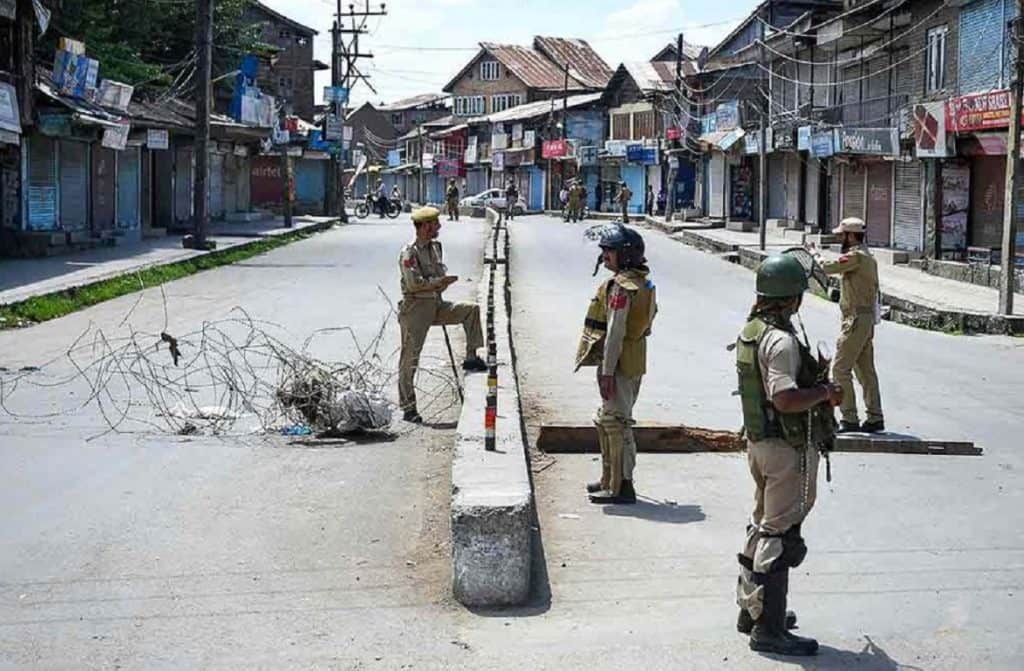By Rana Danish Nisar
In the dictionary of wisdom, every problem has at-least any befitting solution but unfortunately, after almost seventy-three (73) years, the “Paradise Kashmir” issue is waiting for a peaceful resolution or solution.

Frankly, it is the major source of destabilizing relations of two traditional enemies and any possible peaceful measures aim to resolve the Kashmir problem can concrete the path of the cordial relationship of India and Pakistan. The school of realists argued that man has human nature is selfish as well as power maximization and wants to exercise his power over others. As the individual entity of this anarchic world, one can connect the nature of humans with the state’s nature that is selfish too.
In my point of view, the new concepts of Realism of the twenty century are the revised forms of old concepts i.e. colonialism, expansionism, etc. In previous centuries, major powers entertain their powers over other week powers, and this entertainment was entirely connected with expansionism and one wise man with the help of his wisdom can juxtaposition this expansionism with realism. Additionally, doesn’t matter this juxtaposition is classical realism, neo-realism, defensive or offensive realism but it was realism. In the times of yore, Great Britain, French, and Japan were the greatest colonial powers.
On the sunny day of Sunday and the date was August 24, 1608 AD, Great Britain’s landed on the port of “Surat” (subcontinent) for trade and investments. The main motive was to build-up the factory under the headship of Sir Thomas Roe. By following their foxy deceits along with the lust and accessibility of natural resources of the sub-continent, the British used their treacherous, dodgy, and disingenuous course of action and make friendships with local rulers, Maharaj’s, and mango people aim to show their soft image.
With time, the lust for rule over the sub-continent was upsurge and the control was increased all over the subcontinent. Soon after the “War of Plessey” in 1757 and the defeat of Nawab Saraj, the assassination of the ruler of Mysore Tipu Sultan on May 4, 1799, the British expansion all over the sub-continent was cleared. After the war of 1857 which is commonly remembered as the “War of Independence” or “Indian Rebellion” in the literature of History of South Asia, the British defeated Indians, and the British direct rule was started in the sub-continent. Paradoxically, the policy which was adopted by the British in the sub-continent was “Divide and Rule” and try to manipulate the Indian inhabitants (Muslims, Hindus, and Sikhs) against each other and rule over them. The policy was quite successful and the British enjoy the rule for almost ninety years.
After the inauguration of World War II, the position of the British was vulnerable in the sub-continent due to the political instability in the sub-continent, demands of separate homelands by Muslims and Hindus, the Japanese continually victory in World War II, the involvement of the British in the war and deny of the USA in the war. After the demise of World War II, the position of the British was not as strong as compared to the past and they decided to grant independence to the sub-continent. But they remember their old policy of “Divide and Rule” and before leaving the sub-continent, they left the issue of “Kashmir” and other territorial disputes under the “Redcliff Line”.
Since the day of birth, the Kashmir issue is the main source of tension between India and Pakistan but every time the paradox course of actions and their fake promises rub salt on the blood old wounds. Major Powers know very well that if the Kashmir issue resolves peacefully, their involvement in the region will have vanished. The 1948, 1965, 1971, Brassstack crisis, Kargil war, Compound crisis, and continually nuclear developments from both side India and Pakistan are the byproduct of this tension between Pakistan and India.
The abrogation of 370 article, killing of Kashmiri people, long deadly lock-down by the hawks of New Delhi and Modi as well as his administration give clear signal to the world that “Human Rights” organizations, charter of United Nations, Red Cross and other human rights protection bodies are nothing for us but just the piece of tissue paper. The multiple UN resolution have been passed since 1947 aim to resolve the Kashmir issue but these resolutions seems likely to the paper work. The major powers know that south Asian peace and stability is associated with Peaceful relations of India and Pakistan and any type of instability can call the catastrophic destruction. The peace of South Asia is essential and this peace is associated with peaceable resolution of Kashmir issue.
Additionally, the complex nature of major powers and their course of actions while treating India and Pakistan with two different angles are ambitiously full of doubts, qualms and suspicions. One side they want peace and they arise slogan of a stable of BOP between India and Pakistan and on the contrary or another side they grant special their protection to India in its all wrong and false looms.
The diplomatic, political, economic, and strategic support to India by western major powers leaves the source of philosophical and psychological concerns for Pakistan. India is now the biggest arms importer of in the world and all the purchasing destination of India is west. Moreover, western major powers grant special shelter to India in MECs cartels i.e. MTCR. AG, WA, and NSG are improving Indian BMDs power and leaves Pakistan’s zero-sum missiles deterrence vis-à-vis India. The support in the UNSC is promoting the Indian power projection and empowering its hegemony which has pessimistic costs for Pakistan.
The sharing of advanced weapons with India is increasing Indian military muscles in South Asia and upsurge asymmetry in India-Pakistan conventional domain. These de-hyphenation policies of major powers while dealing with India and Pakistan has definite meaning, practice, implications, and costs and maybe sooner or later they are catastrophic respectively.
Summarily, major powers know the dolour and dreg veins of week states and they can press them at any time, in an hour, in a minute, in a second to stop the blood. Interestingly, the problem and solution are directly proportional to each other. Go head, frankly, major powers also know the solutions but they don’t want a solution for the peace of the world.
Kashmir issue is also enlisted in the list of awaiting solutions but this wait is going to be very long and long and now filled with unfulfilled hopes. Since the times of yore, the policies of major power are directly or indirectly associated with “Divide & Rule” and this policy can be seen by any man of wisdom in the tale of “Kashmir” issue and sympathetically can say “I AM SORRY KASHMIR”.
Author: Rana Danish Nisar PhD (International Relations) Student at the School of Politics and International Studies (SPIS). He holds Mphil in (International Relations), Masters in (Pakistan Studies), and Masters in (International Relations) degrees. He won acceptance Harvard Project for Asian and International Relations HPAIR (USA), 2017. His research interests are broadly in South Asian Affairs, South Asia Geo-Politics, US and South Asia, Indian Ocean, Security studies, South Asian developments studies.
(The views expressed in this article belong only to the author and do not necessarily reflect the editorial policy or views of World Geostrategic Insights).







